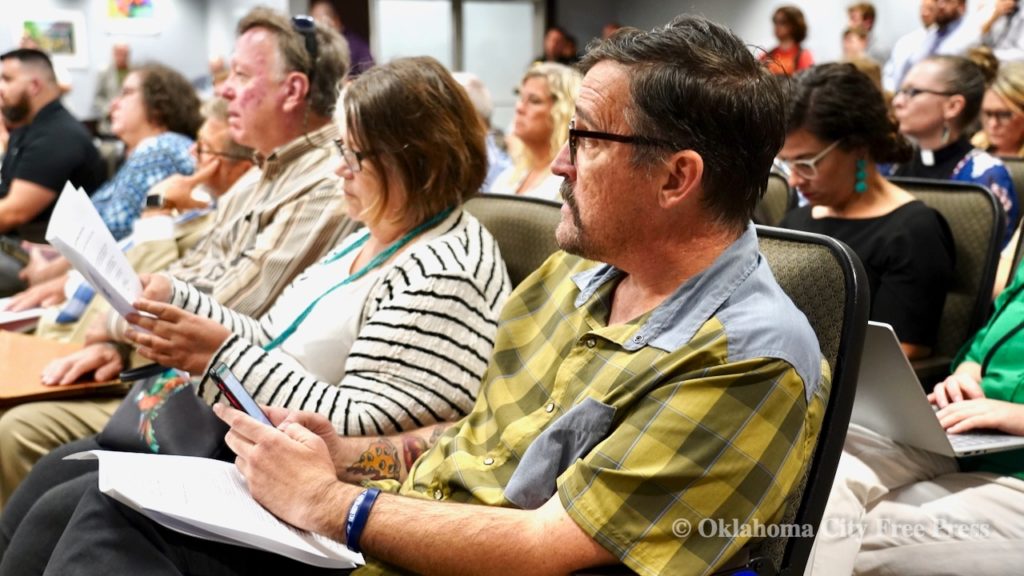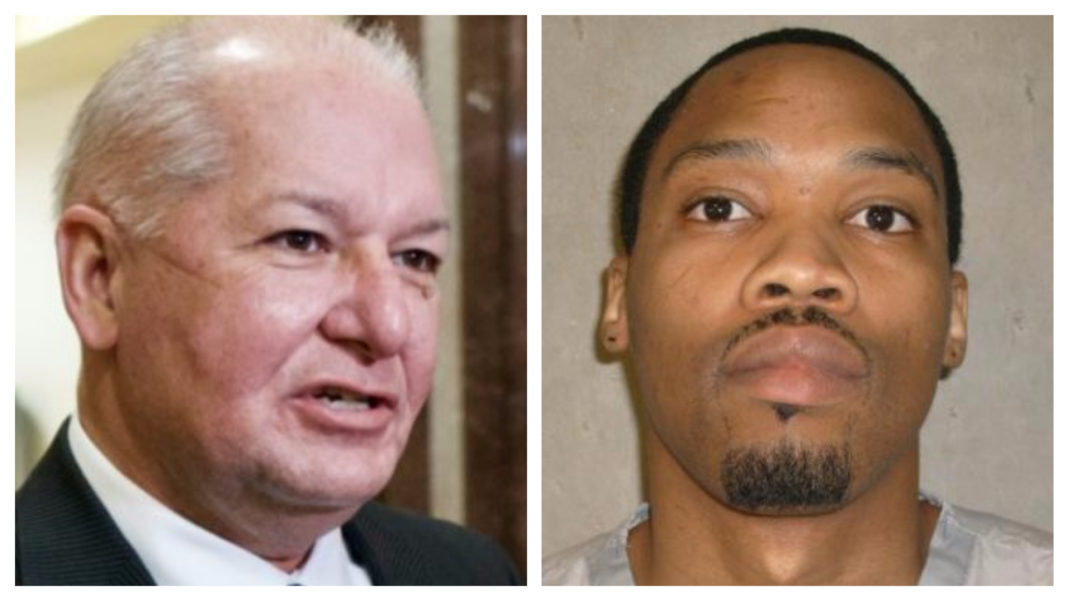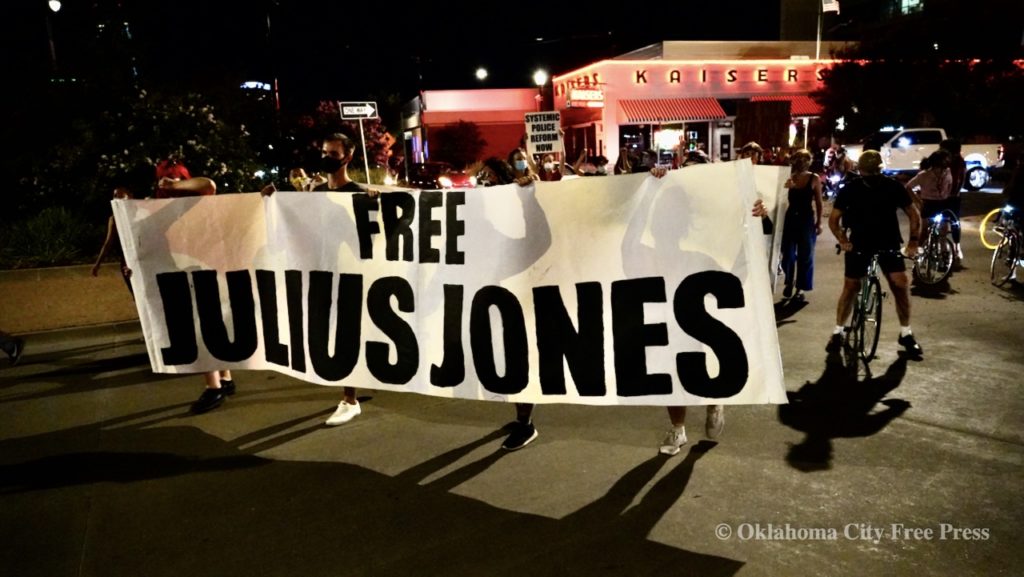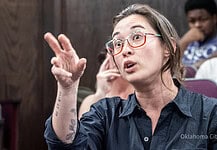Last Updated on September 13, 2021, 5:17 PM | Published: September 13, 2021
OKLAHOMA CITY (Free Press) — The Oklahoma Pardon and Parole Board (PPB) met on Monday to hear the case for and against commuting the sentence of death for Julius Jones.
The much anticipated meeting of the PPB drew crowds of Jones supporters and family and friends of Paul Howell, the man Jones is accused of having murdered.
After the difficult three-and-a-half hour meeting, the PPB voted 3-1, with one recusal, to recommend the commutation to Governor Kevin Stitt.
The meeting had three segments before a vote was taken.
- First, the family of the victim were given thirty minutes to make prepared comments.
- Then the District Attorney’s office, in the person of Prosecutor Sandy Elliott, was given thirty minutes to argue against commutation.
- Finally, delegates representing Mr. Jones were given thirty minutes to argue for commutation.

Marty Peercy reports Local government
Family
Members of the Howell family addressed the Board first. Howell’s sister, two brothers, and one of his daughters each spoke in turn, while other family members and friends sat behind them.
Howell’s sister, Ms. Toby, was the only credible eye witness to the shooting of Mr. Howell. Her description of the shooter has been called into question various times.
In her description to police, she said that the shooter had a stocking cap on and that his hair stuck out a couple of inches below the cap. According to Jones’s attorneys, pictures of Jones from shortly before the crime, and a picture of him at booking show him with very closely cropped hair.
Toby claims that she has received letters from Jones asking her to change her testimony. She also said that other supporters of Jones have contacted her to pressure her to change her testimony.
Toby said she is afraid of what Jones will do to her if he is allowed out of prison.
Each of Howell’s family members who spoke stated that they were certain that the right man had been sentenced to death for the murder of their loved one.
District Attorney actions
Sandy Elliot was the prosecutor in the Jones trial 20 years ago. She is still with the Oklahoma County District Attorney’s office, and represented the office at Monday’s hearing.
Previously, Oklahoma County DA David Prater has tried to have Board members Adam Luck and Kelley Doyle prevented from hearing the case, even going as far as to write a guest editorial against the two for The Oklahoman, a legacy newspaper based in Oklahoma City.
The Oklahoma Supreme Court ruled against Prater last week. Another motion was filed to force Scott Williams to recuse. At Monday’s meeting, Williams chose to recuse “out of an abundance of caution” to avoid the appearance of misdeeds.
DA’s argument
Elliott asked the Board to not punish the Howell family for her actions, implying that commutation would somehow “punish” the victim’s family.
Elliott then proceeded to go over the various reasons Jones’s defenders have listed as reasons to commute the sentence.
The Jones family has maintained that Julius was at home having dinner and playing games on the night of the murder. His alibi was never brought up by the Public Defenders at Jones’s trial.
Elliott claims that it was not brought up because it was not a credible alibi. According to Elliott, Jones told his then-girlfriend that he was not at home the night of the crime.
Elliott also shared many of the claims made by Jones’s alleged co-conspirator, Christopher Jordan. Much of the case against Jones was made on the strength of testimony from Jordan.
Jordan received a lighter sentence than Jones, and with time credited spent 15 years in prison for the theft of Mr. Howell’s vehicle.
Several witnesses have come forward to testify that while in prison Jordan claimed responsibility for the murder. Those witnesses, Elliott claimed, aren’t credible. She cited the felony records of those witnesses, and made the spurious claim that Jones supporters have incentivized the witnesses to make these claims.
Elliott made the claim that “racism” has been invoked and that it muddies the otherwise clear waters of the case.
She went on to animalize Jones, describing him as prowling through the night to commit crimes, citing an incident wherein she and police have made the assumption Jones was waiting to mug somebody at an ATM. That robbery never happened, to be clear.
The defense
Amanda Bass, one of Jones’s attorneys, addressed the Board in the next segment of the meeting.
Bass said that the prosecution didn’t talk about Jones’s case as much as they talked about his “thuggishness” at the hearing on Monday.
Bass deftly made arguments about poor or incompetent representation in the original trial of Jones. The public defenders in that case have both signed affidavits saying that they were terrified of the case. It was the first capital case for either, according to Bass.
Jones’s attorneys did not call a single witness in the original trial, including Mr. Jones himself.
Bass also addressed the DNA sample taken from a red bandana found in Jones’s home. She said that the prosecutors claimed that the DNA was a direct match to Jones, however, FBI standards require eight genetic markers in DNA samples in order to be saved in their database. The DNA used in Jones’s trial only had 5-7 genetic markers.
Bass argued that Jordan’s testimony was not credible, as he had everything to gain by pinning the blame on Jones.
Bass claimed that prosecutors told Jordan that they had him on video stealing a car at a Hideaway Pizza, and that if he didn’t cooperate they would prosecute him for that robbery. Elliott had earlier claimed Jones was responsible for those robberies, but there is no evidence to that claim.
Bass also explained that one of the State’s witnesses against Jones was also a material witness in two other prosecutions that were later vacated, raising serious concerns about his credibility, and the prosecutors.
Bass closed by saying that our system often makes mistakes.
Senator George Young and Kelly Masters, an attorney and sports agent, then each spoke about Jones on a personal level, before the Board called a fifteen minute recess.
Votes
Chairman Adam Luck explained to those present that there are too many questions in this case. Luck said, finally, that he has too many doubts in this literal life or death situation. With that he voted “yes” for commutation from death to life.
Larry Morris said he agreed with Luck’s opinion, and likewise voted yes.
Kelley Doyle also agreed with Luck, and added that science shows that the brain of a 19 year old–Jones’s age at the time of Howell’s murder–is not yet fully developed, and she couldn’t agree to allowing somebody to die for actions they may or may not have taken when they were so young. She also voted yes.
Richard Smothermon pointed out that his vote was pointless, then went on to voice concern about setting a precedent within this Board. He voted no.
As Scott Williams had recused, he made no comments and did not vote.
With a 3-1 affirmative vote, the recommendation of the Board to commute Jones’s sentence will be sent to the Governor, who will have the final say on whether Jones is executed or if his sentence will be commuted to a life sentence.
There is no statutory deadline for the Governor to make his decision. As an execution date has not been set, there is no way to speculate on how long it will be before the Governor announces his decision, if indeed he makes a decision publicly.
Columnist covering local government in Oklahoma City and Oklahoma County from May 2019 through June 2023.











